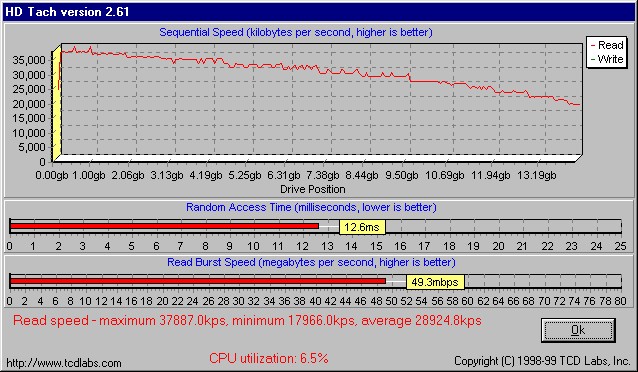Sustained Transfer Rates
(33.3MHz
PCI Speed)

(35MHz PCI Speed)

Windows 98SE Transfer
Rates
15.3GB
IBM------> 632MB/100sec=6.32MB/s
30.7GB Maxtor--> 632MB/113sec=5.59MB/s
Results
Notice that
the peak burst speeds are far from ATA66 or ATA100 specs. This is due to the
HighPoint 368 controller on the Iwill VD133Pro that can be used in a RAID
array. When better drivers and/or BIOS updates arrive, this peak speed should
hit nearer to the theoretical maximum of 66MB/s. Notice the slight increase
in peak speeds when the PCI bus was overclocked. Sustained transfer rates
were unaffected.
While fiddling
with transfer rates, I decided to touch on overclockability. Previous IBM
drives were known to be very overclockable (pushing the PCI bus to speeds
above 33.3MHz). The 75GXP was run with 100% stability at PCI bus speeds from
29MHz to 37MHz.
The IBM 75GXP series of
drives are the fastest IDE models I've tested to date, with an STR exceeding
35MB/s in the first GB of HD space. This will be efficiently utilized when
selecting a fixed swapfile and placing it at the front of the first platter.
Noise hasn't been much
of an issue with hard drives of late and the 75GXP series I consider to be
unusually quiet. Emitting only a soft high frequency tinkling sound, it does
it's job without the familiar "chunking" sound when defragmenting.
Conclusion
Selling on
the web for under $110, the IBM 75GXP 15.3GB 7200 RPM hard drive is a great
choice for all your high performance storage needs. Sporting sustained transfer
rates exceeding 37MB/s and an overall average of nearly 29MB/s, this single
platter solution runs warm to the touch and is also quiet. Overclockers can
use this drive with all sorts of oddball bus speeds. Combine the aforementioned
traits with IBM's excellent reliability record and customer service and you
wind up with a product that is easily a best in class recommendation.
William
Yaple
06/30/00
